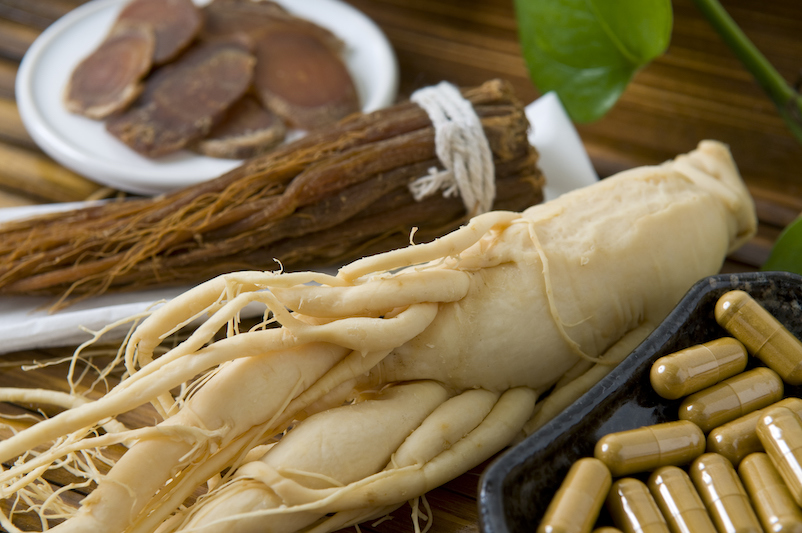
Menopause symptoms can be rough and relief can be elusive. Doctors often prescribe birth control pills, antidepressants, anti-seizure meds, and high blood pressure meds. But what about natural remedies? Plant-based supplements have around for centuries. Are they safe? Do they work for insidious hot flashes, mood swings, sleeplessness, and more?
There’s a lot of controversy around natural supplements for menopause. There are limited studies about their effectiveness, and supplements in general aren’t regulated by the FDA. So we don’t have science-based proof that they work, and we don’t necessarily know exactly what’s in a bottle that claims to be black cohosh or ginseng. What’s more, just because a thing is natural doesn’t mean it’s safe. Every supplement has possible side effects.
Before you hit up the supplement aisle, get the lowdown on a few popular solutions for menopause symptom.
Black Cohosh
Black cohosh has a long history of being used to treat symptoms of perimenopause. Its most popular use is to treat hot flashes and night sweats. In one recent study, black cohosh was given to 80 postmenopausal women who experienced hot flashes. After 8 weeks, the number of their hot flashes was significantly less compared to the first week.
Black cohosh may also help reduce fatigue and reduce pain.
If you are looking to help reduce hot flashes with black cohosh, look for supplements that contain black cohosh root, like Mia Vita Hot Flash Relief, which is the medicinal part of the plant.
Side effects of black cohosh are typically mild. Some side effects include headache, nausea, indigestion, and cramping. Cases of liver damage have been reported following the use of black cohosh; however, researchers aren’t sure whether that’s a result of the supplement.
Apple Cider Vinegar
Some claim that kitchen staple apple cider vinegar (ACV) could help lessen the severity of hot flashes by regulating the body’s toxins. Others claim that it could relieve itching caused by vaginal dryness. We couldn’t find any medical evidence to support either of these claims.
So why all the hype around ACV? It’s relatively safe (outside of potential tooth erosion from the acidity), it’s easy to find, and it has been proven to help with blood sugar control. As for the relief of menopause symptoms? No dice.
Evening Primrose Oil
Evening primrose oil contains gamma-linolenic acid, a fatty acid involved in the production of prostaglandins. The additional prostaglandins could help counter menopause symptoms like anxiety, hot flashes, hair loss, and more. But like many natural supplements, there is no medical evidence that proves that evening primrose oil works for menopause symptoms. Side effects could include upset stomach, headache, nausea, and diarrhea.

Ginseng
Ginseng has been used for centuries to cure a variety of illnesses, and it’s still popular today. It has been proven to help with menopause symptoms. One study found that ginseng boosted the sex drive of menopausal women. Another study found that ginseng helped decrease the risk of cardiovascular disease. It’s also possible that ginseng improves mood and helps with sleeplessness. Side effects could include diarrhea, insomnia, and headaches.
St. John’s Wort
St. John’s wort is reputed to treat mild depression, which so many women suffer during menopause. There is evidence to support that. It may also improve sexual well-being. Combined with black cohosh, it could be effective in treating concentration issues, sleeplessness, and vaginal dryness. While mostly safe, St. John’s wort shouldn’t be taken in large doses and could cause side effects like upset stomach, dry mouth, and headache.
Wild Yam
Although a wild yam supplement is often promoted as an alternative to estrogen therapy, our bodies don’t turn it into estrogen. It sometimes appears in creams that claim to help with hot flashes and night sweats, but there is no evidence that wild yam can play any role in relieving menopause symptoms.

Soy
Soy contains plant estrogens, which could help relieve menopause symptoms like hot flashes. There’s a lot of evidence to support that. In Asian countries where soy is a common staple, women have fewer hot flashes. One study showed a marked reduction in hot flashes for women taking soy.
“There is some good data that soy can reduce both the frequency and the intensity of hot flashes by about 50 percent,” says Machelle Seibel, professor of clinical obstetrics and gynecology at the University of Massachusetts Medical School in Worcester. “A lot of doctors feel that somehow that’s not significant enough, and would prefer that it eliminate all hot flashes.”
But 50 percent fewer hot flashes sounds good to us! Soy is generally safe, so if you’re seeking menopause relief, it could be the easiest option.
Dong Quai
Dong quai has been used in Asian countries for thousands of years to help build blood health, increase immunity, and relieve pain, among other things. It’s known for reducing menstrual cramps, and some women take it to relieve hot flashes.
However, we don’t know for sure how effective it is, since studies on the supplement are limited. It has several alarming side effects, including difficulty breathing, low blood pressure, and increased bleeding risk. People who are allergic to carrots should avoid dong quai, because it belongs to the same plant family.
Red Clover
Red clover is a flower that is used to treat everything from hair loss to skin cancer. As for menopause, there is some evidence that red clover could reduce the severity, but not the frequency, of hot flashes. Like so many natural supplements, there are contradictory findings on just how effective it is for menopause symptoms.
As for side effects, red clover can cause rashlike symptoms, nausea, and vaginal bleeding. Anyone sensitive to hormones or who has a protein S deficiency or a bleeding disorder should avoid red clover.
French Maritime Pine Bark Extract
Pine bark extract, or pycnogenol, includes plant-based hormones called flavonoids. One study found that taking pine bark extract for four weeks significantly improved hot flashes and other menopause symptoms. It’s also generally safe, although it has some side effects, including dizziness, headaches, and stomach problems.
Always Get a Doctor’s Advice
Whether you’re curious about alternatives to hormone replacement therapy or you just like the convenience of your local health food store, there is one very important step you need to take before you stock up on supplements: talk to your doctor. Your clinician will be able to help you decide which supplements, if any, are good matches for you.